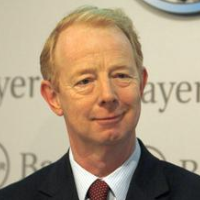Bayer CEO Says Cancer Drug is for Insured Western Patients, not for Indians
 Bayer CEO Marijn Dekkers (AP Photo)
Bayer CEO Marijn Dekkers (AP Photo)
Just before losing a critical patent legal battle in India, an executive of a leading Western pharmaceutical company lashed out against the country and its people for seeking affordable medical treatment.
Last week, an Indian patent court ordered Bayer to allow a small Indian generic drug company, Natco Pharmaceuticals, to sell inexpensive copies of the cancer drug Nexavar.
Bayer still owns the patent on Nexavar, which has been a lucrative treatment for the German-based company. It has insisted on selling the drug in India for $69,000 for one year of treatment—a cost that’s 41 times the per capita income of the average Indian.
Natco, though, proposed selling it for $177.
While the case was still being decided, Bayer Chief Executive Officer Marijn Dekkers said a ruling against his company would amount to “essentially theft.”
“We did not develop this medicine for Indians,” Dekkers said, according to Bloomberg News. “We developed it for western patients who can afford it.”
It is actually rare that patients themselves pay for the drug. Most of the cost is covered by insurance companies or government, which drug companies refer to as “payors.”
Bayer is not the only Western drug maker in danger of losing patent control of its profitable medications in India.
Merck and Bristol-Myers Squibb are closely watching a government-appointed panel that is deciding whether to approve compulsory licenses for two diabetes drugs, an HIV drug and an arthritis drug. Compulsory licensing—which is what happened in Bayer’s case—occurs when a government permits a company to manufacture a product without permission from its patent holder.
The Indian government is not oblivious to the potential international ramifications of compulsory licensing decisions made by its patent court, according to Leena Menghaney, a patient advocate at Doctors Without Borders in New Delhi. “What the Indian government is really worried about is the court cases that will follow from drug companies,” Menghaney told Bloomberg News. “It’s worried about the international criticism it will face from developed country governments who back their pharmaceutical companies, and the impact it will have on the India-U.S. relationship.”
-Noel Brinkerhoff, Danny Biederman
To Learn More:
Merck to Bristol-Myers Face More Threats on India Drug Patents (by Ketaki Gokhale, Bloomberg News)
Indian Patent Ruling against Bayer Clears Way for Low-Cost Generics in Blow to Big Drug Firms (by Noel Brinkerhoff, AllGov)
How To Charge $1.6 Million For a New Drug And Get Away With It (by Matthew Herper, Forbes)
- Top Stories
- Unusual News
- Where is the Money Going?
- Controversies
- U.S. and the World
- Appointments and Resignations
- Latest News
- Musk and Trump Fire Members of Congress
- Trump Calls for Violent Street Demonstrations Against Himself
- Trump Changes Name of Republican Party
- The 2024 Election By the Numbers
- Bashar al-Assad—The Fall of a Rabid AntiSemite






Comments